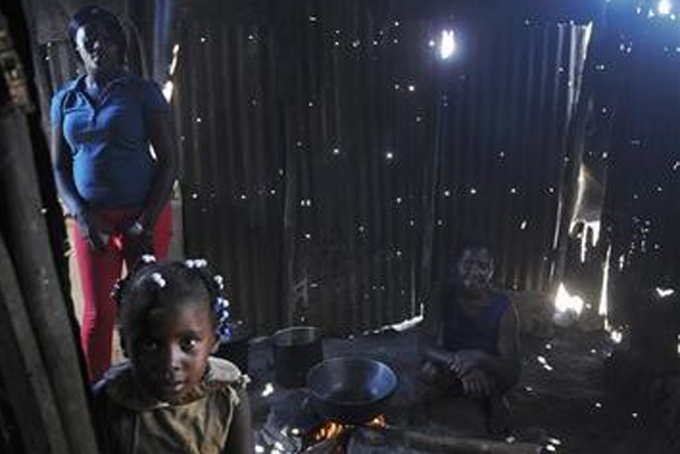
In this Sept. 30, 2013 photo, Juliana Deguis Pierre, behind left, a Dominican woman of Haitian descent, stands inside the kitchen of her home with her daughter Mairobi and mother Maria in the Los Jovillos village, known as a batey, in the Monte Plata province of the Dominican Republic. Juliana and her daughter Maria are two of many who were born in the Dominican Republic but may now lose their citizenship, and the rights that go along with it, because of a recent Constitutional Court decision. (AP Photo/Manuel Diaz)
by Zachary Lester
(NNPA)–The Institute of the Black World 21st Century(IBW) has joined the chorus of nations and organizations protesting the recent ruling by a Dominican Republic court that revoked the citizenship of hundreds of thousands Dominicans of Haitian descent.
The controversial decision, which came in September, was the subject of a strongly-worded letter by IBW president Ronald Daniels to Dominican Republic President Danilo Medina Sànchez.
“This blatant violation of human rights is an insult to decent and fair-minded people across the globe and a serious setback to human rights and democracy in the Caribbean and Latin American region,” Daniels wrote. “We call on you to use the powers of your good office to immediately rectify this egregious situation.”
Citizenship in the Dominican Republic was originally determined by place of birth. That changed in 2010, when the Dominican Republic’s Constitutional Court defined citizenship as belonging to “any person born within the territory of the Dominican Republic, except those born to members of the Diplomatic or consular missions, and foreigners who are in transit or reside illegally in Dominican territory,” according to news reports.
“Generations of persons of Haitian descent, born in the Dominican Republic, have faced administrative and legal barriers to Dominican citizenship, despite the birthright citizenship provisions of the Dominican Constitution,” the Center for Migration Studies wrote on its website.
“The Constitutional Court of the Dominican Republic issued a ruling to revoke the citizenship of the children of unauthorized migrants born in the Dominican Republic since 1929,” the group continued. “The ruling held that Haitians who migrated to work on Dominican sugar plantations and in other labor sectors were ‘in transit’ and, therefore, their children were not entitled to citizenship.”
The decision led to an outcry from civil and human rights organization around the world. On the one-month anniversary of the ruling, people in the Dominican Republic affected by the ruling demonstrated in front of the court. A protest was also held at the Dominican Embassy in New York.
In a statement, Daniels said more than 100 participants at a recent IBW symposium entitled “The Future of Democracy & Development in Africa” unanimously condemned the decision.
Participants included Dr. Ralph Gonsalves, the prime minister of St. Vincent and the Grenadines, who read a letter that he had sent to Sanchez. He called the ruling “unacceptable in any civilized community” and an “affront to all established international norms and elemental humanity” in the letter.
Daniels wrote that the IBW would lend its voice to the organizations that “challenge this racist ruling before the Inter-America Court of Human Rights.”
In the conclusion of his letter, Daniels said to Medina, “Mr. President, we trust that as a person of conscience, integrity and high principles you will move swiftly to condemn and revoke this immoral ruling. Your own citizens of Haitian descent, along with the people of the entire Americas, expect nothing less.”
The East Elmhurst, N.Y.-based IBW works to improve the quality of life for people of color and encourages efforts to uplift them socially, politically, economically and culturally.
Zachary Lester is a staff writer for the Afro American